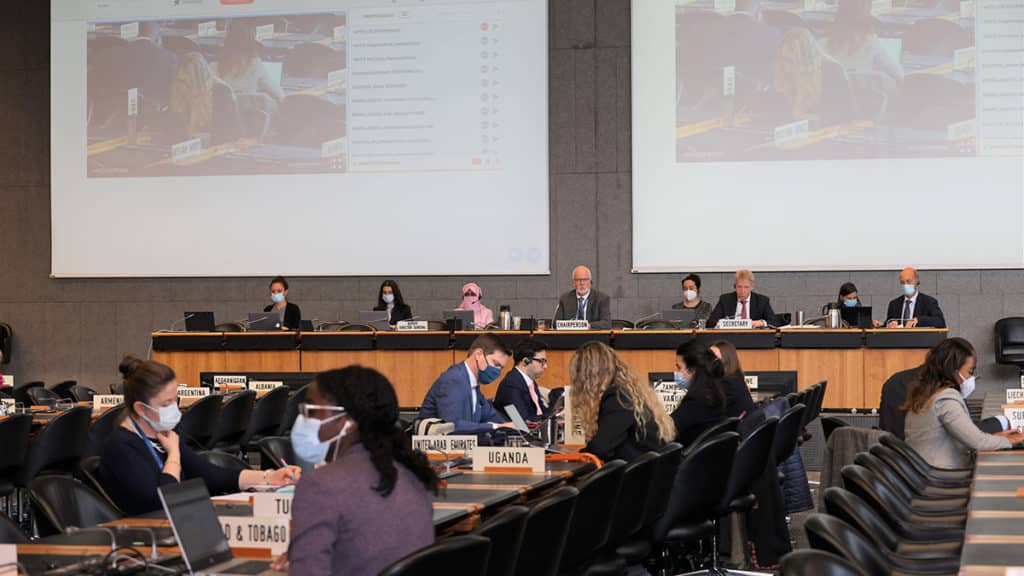Miembros reciben información sobre las conversaciones de alto nivel para encontrar la convergencia sobre la respuesta a la COVID-19 desde la perspectiva de la PI

Los Miembros de la OMC fueron informados de las consultas políticas de alto nivel que están teniendo lugar para tratar de converger en los aspectos relacionados con la propiedad intelectual de una respuesta de la OMC a la COVID-19. En una reunión del Consejo de los Aspectos de los Derechos de Propiedad Intelectual relacionados con el Comercio (ADPIC) celebrada los días 9 y 10 de marzo, los Miembros acordaron mantener abiertos dos puntos conexos del orden del día sobre la repuesta de la OMC, a fin de permitir al Consejo volver a reunirse con breve preaviso en caso de que se esté cerca de la convergencia. El Consejo eligió al Embajador Lansana Gberie (Sierra Leona) como nuevo Presidente.
(de momento sólo en inglés)
Some of the members participating since December 2021 in the high-level talks – the European Union, India, South Africa and the United States – expressed cautious optimism about a possible outcome and asked for patience from the rest of the membership. These members said that the small-group discussions continue to take place in good faith, with the objective of finding a landing zone that delivers on the common purpose of ensuring equitable access to vaccines, therapeutics, and diagnostics.
They stressed that any framework that emerges from this process, under the coordination of WTO Director-General Ngozi Okonjo-Iweala and Deputy Director-General Anabel González, will be subject to consideration by the TRIPS Council and its full membership. They also underlined that achieving an effective outcome on this critical issue would serve the ultimate purpose of tackling the ongoing crisis as well as ensuring that the credibility of the WTO is restored.
Generally, members were supportive of the small-group consultations and encouraged those participating to regularly update the TRIPS Council. However, some members asked for greater transparency and inclusiveness in order to reach an outcome that represents the views of the whole membership. For these members, progress towards an outcome on an IP COVID-19 response cannot be expected if the TRIPS Council does not know the details of discussions that can result in taking forward discussions on the wider pandemic response.
The chair of the TRIPS Council, Ambassador Dagfinn Sørli of Norway, said that expectations and hopes remain, as the current high-level process may result in framing a platform upon which the membership at large may be able to build something that can result in a consensus-based solution. He added that all efforts should be made to keep the entire membership informed and involved in the deliberation of the items which are part of the Council’s agenda.
Members agreed to keep open in the agenda of the TRIPS Council the proposal for a waiver from certain provisions of the TRIPS Agreement for the prevention, containment and treatment of COVID-19 (IP/C/W/669/Rev.1) and the Draft General Council Declaration on the TRIPS Agreement and Public Heath in the Circumstances of a Pandemic (IP/C/W/681) so that the Council can be reconvened at short notice if substantial progress is made in the high-level talks.
At its last formal meeting on 22 February 2022, the Council agreed to once again provide a «Status Report on the consideration by the TRIPS Council of the waiver proposal» to the General Council meeting of 23-24 February 2022. That report provided a factual overview of the waiver discussions in this Council and highlighted members’ common goal of providing timely and secure access to high-quality, safe, efficacious and affordable vaccines and medicines for all.
The report concluded that the TRIPS Council will continue its consideration of the waiver request and report back to the General Council as stipulated in Article IX:3 of the Marrakesh Agreement.
«Let me once again urge delegations to remain fully engaged with a sense of urgency, and with the objective to find a path forward towards a consensus-based outcome. Let me also remind all members that transparency and inclusiveness are central pillars of the WTO’s modus operandi and that all efforts should be made to keep the entire membership as much as possible informed and involved in the deliberation on items on the Council’s agenda,» said Ambassador Sørli.
Technology transfer to LDCs
A virtual workshop on the implementation of Article 66.2 of the TRIPS Agreement on incentives for technology transfer to LDCs was held the week before the TRIPS Council. Government officials from LDC members and observers, developed country members, cooperation partners, academia and civil society participated on 2-4 March in the workshop aimed at analysing and enhancing the benefits of the transparency mechanism concerning technology transfer measures under the TRIPS Agreement.
Article 66.2 of the TRIPS Agreement calls on developed countries to provide incentives to enterprises and institutions in their territories for the purpose of promoting and encouraging technology transfer to LDCs in order to enable them to create a sound and viable technological base.
The workshop provided a unique opportunity for informal dialogue between the various partners involved in technology transfer to LDCs. It provided developed members with a better understanding of the needs and priorities of LDC members. It also allowed them to share experiences and identify best practices in order to assist members in learning from each other and enabling them to target their incentives in a way that responds effectively to the needs of individual LDCs.
The LDC Group welcomed the focus of the workshop on key issues for LDCs, such as environment, health and agriculture, and thanked developed country members for submitting their annual reports. The LDC Group confirmed it will soon share their feedback with specific points of concern as well as priority needs and reiterated that one of the main challenges is to understand what specific technology has been transferred. In this regard, LDCs have suggested a template to help report on technology transfer to LDCs accurately and clearly. The LDC Group appreciated that many developed country members have recently started to submit reports in this format.
IP, innovation and microfinance
Following up on past discussions on IP and innovation that have regularly been added to the Council’s agenda since 2012, the Friends of IP & Innovation (FOII) Group of TRIPS members – typically comprising Australia, Canada, Chile, the European Union, Japan, Singapore, Switzerland, the Separate Customs Territory of Taiwan, Penghu, Kinmen and Matsu, the United Kingdom, and the United States – proposed to discuss the links between IP, innovation and microfinance (also known as microcredit).
In their communication sent to members (IP/C/W/686), co-sponsors suggested a discussion and exploration of the modalities and implications of how micro-, small- and medium-sized enterprises (MSMEs) access IP-backed financing. These members noted that MSMEs in general have large unmet financial needs and lack of financing is one of the main obstacles to innovate.
At the same time, innovative or IP-based MSMEs do not appear to be at any particular advantage over «traditional» businesses in terms of access to microcredit. Rather, lack of IP awareness, insecurity over valuation of IP assets and restrictive banking rules regarding intangible assets might represent particular challenges for them when trying to access credit. Given the links between innovation and export performance, this issue has broader implications for inclusion in international trade and thus trade finance, highlighting the importance of collaboration between the WTO and other organizations, such as the International Finance Corporation (IFC).
The LDC Group was especially interested in this initiative and appreciated the concrete examples given by the co-sponsors, asking whether the ongoing projects to facilitate microcredit to MSMEs could be implemented in LDCs. A total of 83 per cent of world enterprises are MSMEs, and micro-financing projects could represent a vital lifeline for them, particularly following the COVID-19 pandemic, they said.
COVID-19 update
Members were updated on IP measures in the context of COVID-19. The basis for the discussions was once more the compilation «COVID-19: Measures Regarding Trade-Related Intellectual Property Rights«. The WTO webpage contains a non-exhaustive list of IP-related measures taken in the context of COVID-19, compiled by the Secretariat from official sources and verified by the members concerned.
At the request of members, the WTO Secretariat provided an interim update on the number of voluntary licence agreements regarding COVID-19 vaccine production over time and on the projected and observed volume of vaccine dose production under these agreements.
The Secretariat also introduced the Annual Report on Notifications and other information flows (IP/C/W/687/Rev.1), which provides analysis and trends in members’ fulfilment of the TRIPS transparency obligations, including detailed member-by-member information on notifications and other TRIPS submissions.
Non-violation and situation complaints
The chair of the Council asked members to consider how to organize work on this issue and benefit from the extra time allowed for discussion following the postponement of the WTO’s 12th Ministerial Conference (MC12) to mid-June 2022 due to the Omicron variant outbreak. Members agreed on 5 November 2021 to recommend to ministers to ask the TRIPS Council to continue its discussions on this issue and to make recommendations to the 13th WTO Ministerial Conference. In the meantime, members would refrain from bringing such cases to the dispute settlement system. This so-called “moratorium” has been extended several times, from one Ministerial Conference to the next.
Non-violation and situation complaints (NVSCs) refer to whether and under what conditions members should be able to bring WTO dispute complaints where they consider that another member’s action, or a particular situation, has deprived them of an expected advantage under the TRIPS Agreement, even though no obligation under the Agreement has been violated.
Members reiterated their well-known positions, which have historically differed on whether such non-violation cases are feasible in IP. Some delegations consider NVSCs essential to maintaining the balance of rights and obligations within the TRIPS Agreement while helping to ensure that legitimate obligations are not circumvented or avoided. Others believe there is no place for the application of NVSCs in IP because of the legal insecurity and curtailment of flexibilities that could ensue and favour their complete ban in the TRIPS area.
TRIPS amendment
The chair reported that, since the last TRIPS Council regular meeting in October 2021, Ecuador had deposited its instrument of acceptance for the protocol amending the TRIPS Agreement with the WTO Director-General.
To date, 134 members have accepted the TRIPS Amendment, which entered into force on 23 January 2017, securing for developing countries a legal pathway to access affordable medicines under WTO rules. The chair said that, together with the Director-General, he had sent letters to the remaining 30 members encouraging them to expedite action in good time before the current deadline for acceptance, which was extended until 31 December 2021.
Next meeting and new chair
The chair indicated that members might wish to reconsider the dates (8-9 June 2022) scheduled for the next formal meeting, given that MC12 is currently planned for the week of 13 June 2022.
Noting that the focus of the Council’s attention between now and MC12 would be on the discussions regarding the TRIPS waiver and the related EU proposal, he suggested that members consider moving the date for the next regular Council meeting to after MC12, once the exact dates of the Ministerial Conference are confirmed, so that meetings prior to MC12 could focus on these issues.
The Council elected Ambassador Lansana Gberie of Sierra Leone as its chair for the coming year. Several members took the floor to commend the work carried out by Ambassador Sørli during a particularly intense and challenging year.














